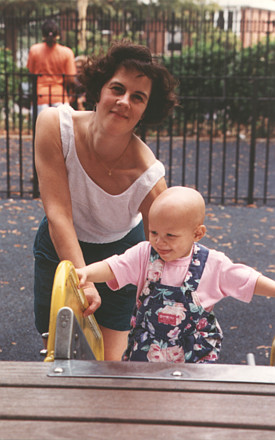当前位置
Making an informed decision about cord blood banking
Cord Blood Registry® sponsored this blog on BabyCenter.com
 Making an informed decision about cord blood isn’t as clear-cut for everybody. In order to inform other parents of the benefits of cord blood stem cells and to help them navigate their options, I launched the Parent’s Guide to Cord Blood Foundation in 1998, in memory of my daughter Shai. Our Foundation is the only non-profit organization with a cord blood mission that is accredited by The Health On the Net Foundation (HON), a quality standard for medical websites.
Making an informed decision about cord blood isn’t as clear-cut for everybody. In order to inform other parents of the benefits of cord blood stem cells and to help them navigate their options, I launched the Parent’s Guide to Cord Blood Foundation in 1998, in memory of my daughter Shai. Our Foundation is the only non-profit organization with a cord blood mission that is accredited by The Health On the Net Foundation (HON), a quality standard for medical websites.
The main fact that expectant parents need to know about cord blood is that birth is a one-time opportunity to collect newborn stem cells that may benefit your children in many ways. The blood-forming stem cells found in cord blood have been used in the treatment of more than 80 conditions. Thus, privately storing or publicly donating cord blood can save lives. Two examples of conditions treated using cord blood stem cells are sickle cell disease and thalassemia, which are particularly prevalent in certain ethnic groups. Studies have repeatedly shown that children who have a blood disorder or certain cancers recover best if the source of the cells utilized in the stem cell transplant, from bone marrow or cord blood, comes from a sibling.
For me, the decision to bank my second child’s cord blood was a no-brainer, because my first child died of cancer. I knew the odds were against another rare disease striking one of my children. But once you have been through such an ordeal, you realize that the unthinkable could happen to your family, and every safeguard is a worthwhile investment.
In addition, children today may use their own cord blood to participate in clinical trials for neurological conditions, such as cerebral palsy or autism, which cause developmental delays. Nearly everyone knows a child who has been diagnosed with an autism spectrum disorder. In my own family, my youngest child Gavi is “on the spectrum.” Autism now impacts 1 in 68 children in the U.S., a 30 percent increase since 2008 according to the CDC.
The main decision that expectant parents need to make about cord blood is whether to publicly donate their baby’s newborn stem cells or to save them privately for their own family. To help educate parents about these choices, we provide obstetricians and childbirth educators with free brochures in both English and Spanish. Our brochures have been adopted by the Department of Health in 6 states: Florida, Missouri, North Dakota, Ohio, Tennessee, and Virginia.
For parents who choose to store cord blood privately, we have a list of available accredited family banks, along with detailed descriptions of their services. Some important things you should look for in a family cord blood bank are a laboratory that is accredited for cord blood banking, a temperature-protected container for shipping cord blood, and previous experience providing stored cord blood for established therapies.
For parents who choose to donate their baby’s cord blood, we partner with Be The Match®, the organization that registers stem cell donors in the United States. Transplant patients from minority and multiracial backgrounds have a harder time finding a matching adult donor and are more likely to rely on cord blood stem cells that were donated by parents like you. Our Foundation maintains a searchable map to guide parents to the nearest hospital that accepts cord blood donations or to find a program that accepts mail-in donations.
On top of these choices about cord blood, parents also have the option to privately preserve the stem cells from their baby’s umbilical cord tissue or placenta. These tissues contain a different type of stem cells from the ones in cord blood. Banking more types of newborn stem cells may give parents more future therapy options and possibly more cells for any given therapy.
Parents should not feel overwhelmed by the conflicting opinions of bloggers who claim to have become overnight experts on cord blood. Parent’s Guide to Cord Blood Foundation explains both public donation and family storage in a balanced way, we have expert advisors guiding our content, we carry a medical accreditation, and we are an educational resource for numerous healthcare providers and government organizations. We are here to help educate parent’s on their cord blood options, enabling families to make an informed decision.



 After Shai passed, I gave birth to two more children. Now, 18 years later in 2016, they are ages 18 and 16.
After Shai passed, I gave birth to two more children. Now, 18 years later in 2016, they are ages 18 and 16.